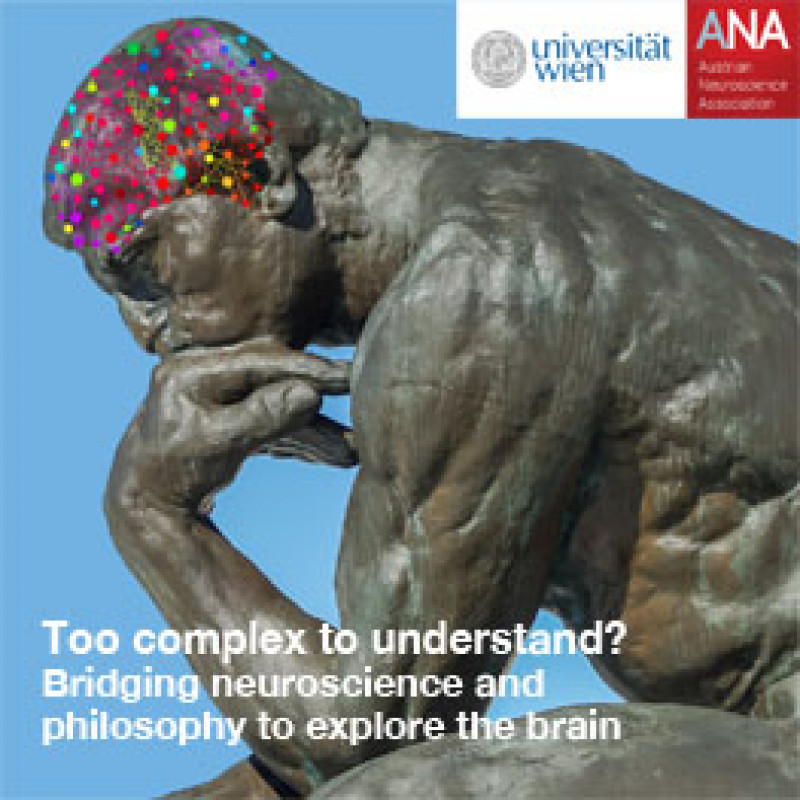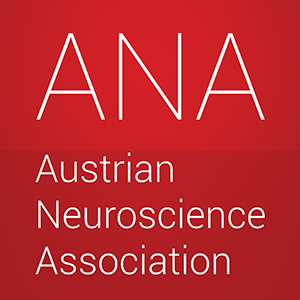Event Details

SATELLITE SYMPOSIUM
Date: 24 June 2024, 3.00–7.00 pm
Venue: Sky Lounge, University of Vienna
Oskar-Morgenstern-Platz 1, 1090 Vienna
Due to space limitation, please register for this event!
The Satellite Symposium takes place ahead of the FENS Forum 2024 and ventures into the intersection between neuroscience and philosophy. The aim of this integrative endeavor is to foster interdisciplinary exchange between neuroscientists and philosophers to discuss conceptual approaches, methods and their assumptions, and the interpretive horizon of domains of neuroscience specifically addressing the complexity of the brain. This shall broaden the knowledge of neuroscientists and raise awareness for characteristic problems when dealing with this complexity.
In this symposium, we aim at discussing the current knowledge on whole-brain activity (in healthy and disease states) and its foundation in experimental and computational neuroscience. Confronting these models with philosophical concepts of causality and inquiries on the explanatory power of different forms of prediction, will allow a better understanding of the strength and potential limitations of today´s concepts of the brain. Moreover, organisms need to integrate their internal state and information by environmental stimuli by means of their nervous system thus neuroscientist exploring brain activity need to consider this complex interaction with due sensitivity. However, a better understanding of the environmental contribution requires a proper consideration how to conceptualize “environment” to operationalize its influence on the brain. Thus, a second discussion will confront neuroscientific approaches to integrate internal states and external stimuli (in health and disease) with reflections on the relevance of different concepts of environment and its relevance for the evolution of brain processes.
Overall, conceptualizing the brain as a complex system, not only calls for cutting-edge empirical investigations and theoretical considerations based on neuroscientific subdisciplines, but also prompts us to exploit insights from philosophy. We, thus, wish to encourage multidisciplinary as well as multi-level research agendas, but also want to emphasize the relevance of direct interaction in interdisciplinary exchange events. Exposing neuroscientists to novel theoretical concepts will help them to address their own research questions from a different perspective.
PROGRAMME
15:00-15.50 – Session 1
Chairs: Igor Branchi, Isabella Sarto-Jackson, Markus Kunze, Thomas Bugnyar
|
|
Markus Kunze (Medical University of Vienna) |
| Plenary Talk: Whole Brain Dynamics, Modelling, and the Thermodynamics of the Mind |
Gustavo Deco (Pompeu Fabra Univerisity, Barcelona) |
|
|
15:50-17.10 – Session 2
Chairs: Isabella Sarto-Jackson, Thomas Bugnyar
| Introductory Remarks | Isabella Sarto-Jackson (Konrad Lorenz Institute for Evolution and Cognition Research, Klosterneuburg) |
| Neuroscience Talk 1: The Role of Context in Uncovering the Determinants of Brain Functioning, Behavior and their Interplay |
Igor Branchi (Center for Behavioral Sciences and Mental Health, Istituto Superiore di Sanità, Rome) |
| Philosophy Talk 1: Conceptualizing Environments in the Study of Cognition |
Alejandro Fabregas-Tejeda (Katholieke Universiteit Leuven) |
|
|
17:10-17.30 – Coffee Break
17:30-18.50 – Session 3
Chairs: Jan-Pieter Konsman, Fátima Sofia Ávila-Cascajares
|
|
Jan-Pieter Konsman (University of Bordeaux) |
| Neuroscience Talk 2: The Dynamcs of Brain Circuits as an Emergent Dynamics of Information |
Demian Battaglia (Aix-Marseille University) |
| Philosophy Talk 2: The Tricky Question of Failure |
Mazviita Chirimuuta (University of Edinburgh) |
General Discussion |
18:50-19.00 – Wrap Up
Concluding Remarks |
Markus Kunze (Medical University of Vienna) |
Speakers:
Gustavo Deco
Born in Argentina, Gustavo Deco is today Professor at the Universitat Pompeu Fabra, Barcelona, Spain where he is Director of the Center of Brain and Cognition and Head of the Computational Neuroscience Research Group. His scientific interests are the flexible integration of information, which is represented and computed in a distributed manner. He tries to integrate different levels of investigations in cognitive neuroscience, and to understand deviations observed in various disease states.
He has 523 papers, more than 30000 citations and an h-factor of 85.
Igor Branchi
Igor Branchi is Senior Researcher and Group leader at the Center for Behavioral Sciences and Mental Health, Istituto Superiore di Sanità; Rome, Italy and visiting Professor of Behavioral biology at the University of Rome Sapienza. His main research interest is on the application of a brain-body-environment inclusive approach to explore the central nervous system and its interplay with behavior. Special attention is paid to the investigation of psychiatric disorders and the development of innovative therapeutic strategies. He is interested in complexity science and philosophical considerations on the effectiveness of scientific approaches aimed at understanding the brain. Current efforts are directed towards the study of the interplay between neural and behavioral plasticity and contextual factors, such as stress and the quality of living conditions, in the treatment and prevention of mental illness.
He has more than 9000 citations and an h-factor of 48.
Alejandro Fabregas-Tejeda
Alejandro Fábregas-Tejeda is a Postdoctoral Research Fellow at the Centre for Logic and Philosophy of Science, KU Leuven (Belgium). He undertook a PhD in Philosophy at Ruhr University Bochum as part of the DFG-Emmy Noether Research Group “The Return of the Organism in the Biosciences: Theoretical, Historical and Social Dimensions” (ROTO) and was a Writing-Up Fellow at the Konrad Lorenz Institute for Evolution and Cognition Research. He has published on diverse topics such as the history of the holobiont concept, organism-environment reciprocal causation, and the Extended Evolutionary Synthesis debate. Alongside Gregory Radick, Jan Baedke, and Guido I. Prieto, he is the co-editor of the volume The Riddle of Organismal Agency: New Historical and Philosophical Reflections (forthcoming in 2024 with Routledge).
Demian Battaglia
Demian Battalia is a computational neuroscience working at the interdisciplinary center FunSy (Functional Systems Dynamics) of Institute for Advanced Studies (USIAS) of the University of Strasbourg. His work is part of an explicitly interdisciplinary research center, which acts at the crossroad between Neuroscience, Physics of Complex Systems and Computation and Information Sciences. His interest it the study of network dynamics at different scales from local micro-circuits up to the whole brain using modelling and sophisticated data analysis. He is particularly interested in the role that oscillatory and network dynamics play in neuronal information processing.
He authored 53 papers and has an h-factor of 20.
Mazviita Chirimuuta
Mazviita Chirimuuta studied physiology, psychology and philosophy and is a Senior Lecturer at the School of Philosophy, Psychology & Language Sciences of the University of Edinburgh with a special focus on the Mind-Brain Sciences. Among her special interests it the philosophy of computational neuroscience and she authored various papers with this focus.
Organization Committee:
• Markus Kunze: Center for Brain Research, Medical University of Vienna, Austria (markus.kunze@meduniwien.ac.at)
• Igor Branchi: Center for Behavioral Sciences and Mental Health, Istituto Superiore di Sanità; Rome, Italy (igor.branchi@iss.it)
• Thomas Bugnyar: Department of Cognitive Biology, University of Vienna, Austria (thomas.bugnyar@univie.ac.at)
• Isabella Sarto-Jackson: Konrad Lorenz Institute for Evolution and Cognition Research, Klosterneuburg, Austria (isabella.sarto-jackson@kli.ac.at)
This event dovetails with another interdisciplinary initiative of the organizers: Igor Branchi, Markus Kunze, Isabella Sarto-Jackson, and Ann-Sophie Barwich are guest editors of a Special Issue in the European Journal of Neuroscience (EJN) entitled “The relevance of a philosophical toolkit to advance neuroscience.”
More about the special issue can be found here:
https://www.fens.org/news-activities/fens-and-societies-calendar/external-calls/ejn-call-for-papers-the-relevance-of-a-philosophical-toolkit-to-advance-neuroscience
This event was generously sponsored by





